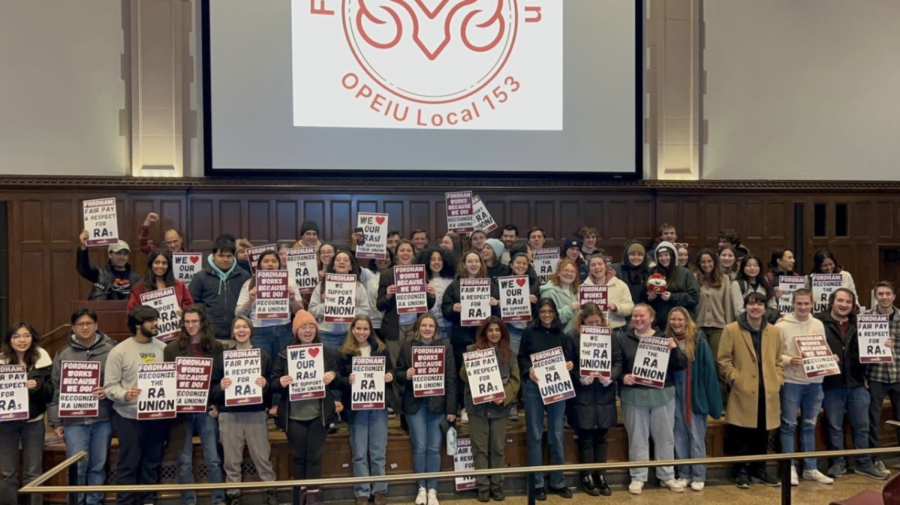Fordham Resident Assistants Union to Vote for Recognition
On Feb. 7, President Tania Tetlow officially refused to recognize the Fordham Resident Assistants union (FRA) after a petition for voluntary recognition from the university was delivered to the president’s office on Feb. 1.
Alongside the petition’s delivery, the union also published a press release announcing its formation as a union under the Office and Professional Employees International Union, Local 153 (OPEIU-153).
The next step for the FRA will be to approach the National Labor Relations Board (NLRB) for a vote. According to the union, the vote will occur in about six weeks and, if successful, will force the university into a legal obligation to recognize the union.
In Tetlow’s message to the union, as delivered to the Ram by Bob Howe, associate vice president for communications and special advisor to the president, the university president provided two reasons for the lack of recognition:
“First, until we have more clarity on whether such a union would include only Rose Hill resident assistants, we do not yet know whether a majority of potential members signed your letter. Second, we would like to ensure that those voting have full information about the processes, dues and rules of a union before voting.”
According to the union’s Feb. 1 press release, 77% of the Resident Assistants (RAs) on campus (of which there are 97) have signed the FRA petition for union recognition.
After delivering the petition on Feb. 1, two members of the union’s organizing committee, Senior RA Peter Wolff, FCRH ’23, and RA Madison Ryan, FCRH ’23, met with The Fordham Ram to speak about why they felt union formation was necessary.
“I’m not going to give you a list of grievances,” Wolff said. “We haven’t gotten to that process yet… There are very broad things like respect, professionalism, the very big one is compensation.”
In the press release, Wolff was quoted as saying the following:
“As an RA I have been put in many high stress, challenging and occasionally dangerous situations. While these situations are a part of the job, Fordham University and Fordham Residential Life express a disregard for RAs’ well-being and a lack of support for RAs doing critical work. Fordham’s lack of respect is also emphasized in inconsistent and unprofessional communication to RAs. This is why we organized a union to improve the quality of life for residents through greater support for RAs.”
Wolff stated that RAs aren’t technically paid for their labor. Instead, RAs receive compensation in the form of an RA Award, which is packaged as a form of financial aid. Because of the official categorization as a financial aid award, receiving an RA Award can reduce a student’s pre-existing financial aid.
According to the press release, “Many students find themselves losing pieces or large chunks of their financial aid package to work this job, which means that not only is RA compensation unfair but unequal for RAs doing the same amount of work. Some RAs are essentially unpaid for their work because of their financial aid reductions.”
Another grievance that the Resident Assistant organizers stated was the want for increased safety and protection for RAs. Combined with respect, professionalism and compensation, Wolff described the general need for “care for the overall being of the RA.”
“I was threatened by a resident,” Wolff said, “and I called security, who didn’t answer the phone. Just mismanagement and lack of care for the procedures that are in place and a general lack of care for RAs in general.” Wolff stated that he wants to see the university’s safety mechanisms respond with more care and attentiveness to reports of dangerous student misconduct within residence halls.
“When RAs report something, there’s nothing on ResLife’s end that does anything,” Ryan said. She explained how having minimal support from higher-ups can lead to RAs having to place themselves in inappropriate situations that require more careful handling than can be provided by student employees.
“We don’t really know the policy. They don’t give it to us until after we get in trouble,” Ryan said.
Ryan references previous conflicts in which RAs have been reprimanded by university officials for speaking publicly or to the press about issues involving the Office of Residential Life or members of university administration, which is prohibited by Fordham’s RA handbook.
“There was no official rule about that before, but then they started winter training this semester,” Wolff said. Wolff said that part of the training was telling RAs not to “write about ResLife.”
“You don’t have freedom of speech, basically,” Wolff said when describing how the training made him feel as an RA.
According to Ryan, these kinds of conflicts are not relayed to any other RAs by Residential Life officials but instead spread by word-of-mouth through group chats and conversations between RAs. Ryan describes this as an example of a lack of communication between university administrators and RAs, as there have been instances in which the rules in question are not widely known amongst or communicated to RAs prior to the incidents.
“[ResLife] said that we can’t talk about certain things because they said it in the handbook,” Ryan said. “They didn’t give out the handbook.” The RA interviewees stated that RAs generally are not provided with the handbook until after they break a rule written in the guide.
Without being given the handbook, Wolff said that it’s harder for RAs to avoid breaking rules that aren’t widely accessible for reference. “I’ve been an RA for three years,” said Wolff when discussing how he would have never known about the rule prohibiting RAs from speaking publicly on ResLife issues.
Speaking more generally about communication between ResLife administration and RAs, “we don’t have anything concrete,” said Ryan. “Everyone’s so terrified of ResLife, it’s actually kind of scary… you never know what could get you fired. They also keep leaving probation and strikes on your file, but no one knows what that means.”
When discussing the demands the FRA union is making, Wolff stated that it has not yet proposed material solutions to the grievances described in the press release and its overall messaging.
“I’m not saying we have all the answers.” Wolff said that the union’s main push is to alert people to the problems that RAs currently face. “Something needs to change, and I’m not saying I know what needs to change like ‘hey, we need this,’ or ‘we need X.’ And since we’re a union too, this is a collective decision that we need to come together.”
“We still have a lot of work to with, ‘hey, this is the specific list of grievances that each person has,” said Wolff.
Ryan described the approach that the union’s organization would take in writing specific demands:
“The people that are going to be going on to doing the solutions and stuff are going to be elected later, and they’re going to be lowerclassmen,” Ryan said before clarifying that, although there are currently underclassmen on the union’s organizing committee, the organizing is being spearheaded by seniors.
Ryan also spoke about why the organization of a union felt like the best solution to approaching the issues and grievances that RAs are facing:
“When I first became an RA, we brought up issues one time, then they muted our Zoom chat. That’s kind of how our relationship has been and that’s been the tone that’s been set. We’ve had people go up individually and talk to people, we’ve had so much turnover. All the RDs I started with are gone, essential staff itself, maybe three or four people are left. When you talk to someone, you don’t get to see the change because they’re gone. With the union, it’s also an outside force with help from lawyers and things that we can’t provide just by going and talking all the time. We’re leaving and want to make sure that whatever happens after this is better.”
Wolff also provided more reasons as to why the formation of a union provides RA organizers with better benefits than if they were to try to solve the issues without unionizing. “The union gives us the ability to negotiate a contract that’s legally binding and lasts for three years,” Wolff said, also stating that the establishment of a contract provides a long-term stability that would otherwise be missing.
The organization of the Resident Assistants at Fordham also comes during a trend of RA unionization with OPEIU Local 153 at other colleges, including Wesleyan, Barnard and Tufts.
The Fordham Ram reached out to officials at the office of Residential Life for comment and did not receive a response.
This is an updating story.

Sebastian Diaz is a senior from Chapel Hill, N. C. who is double majoring in journalism and film. After starting as a news reporter for The Fordham Ram...











































































































































































































